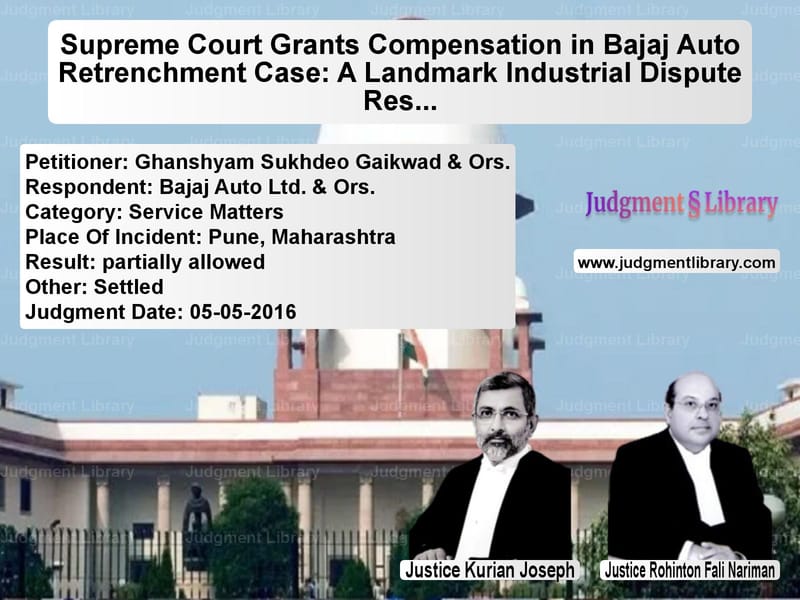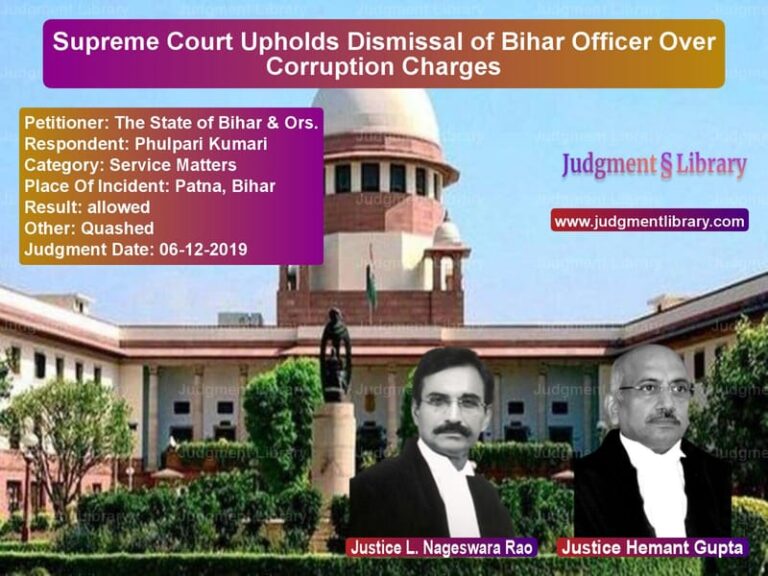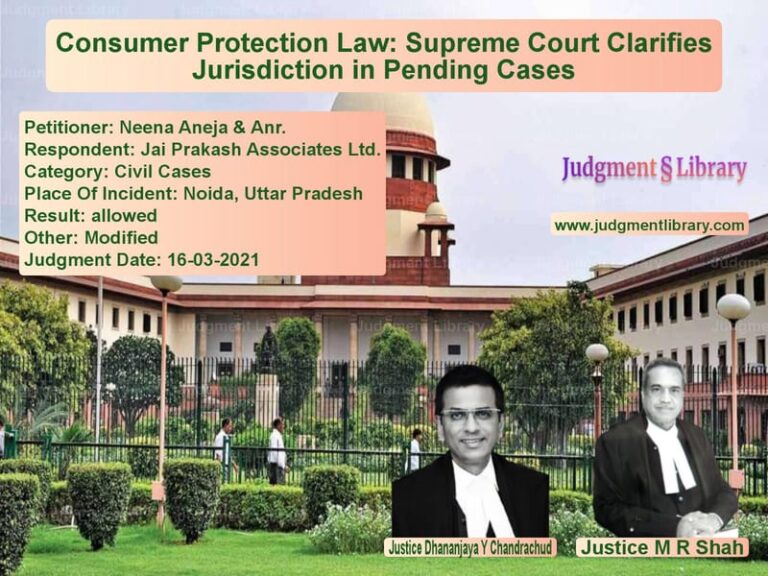Supreme Court Grants Compensation in Bajaj Auto Retrenchment Case: A Landmark Industrial Dispute Resolution
The case of Ghanshyam Sukhdeo Gaikwad & Ors. vs. Bajaj Auto Ltd. & Ors. is a significant ruling in Indian labor law, particularly concerning retrenchment, voluntary retirement schemes (VRS), and compensation for workers. The Supreme Court of India, after nearly three decades of legal proceedings, resolved the matter by ensuring financial relief for the affected employees rather than ordering their reinstatement.
Background of the Case
The dispute dates back to 1991, when Bajaj Auto Ltd. retrenched a large number of workers as part of an organizational restructuring. The affected employees challenged their termination in the Labour Court, arguing that it was unjust and that they were entitled to reinstatement along with back wages. The case went through multiple legal stages:
- The Labour Court dismissed the workers’ complaint, ruling in favor of Bajaj Auto.
- The Industrial Tribunal reversed the Labour Court’s decision, ordering reinstatement but denying back wages.
- Bajaj Auto challenged the Tribunal’s order in the Bombay High Court.
- The High Court upheld the retrenchment, siding with Bajaj Auto.
- The workers then appealed to the Supreme Court, seeking either reinstatement or compensation.
By the time the case reached the Supreme Court in 2016, most of the affected workers had either retired under VRS or moved on. However, a few employees continued litigation, demanding a fair resolution of their claims.
Key Legal Issues
- Was the retrenchment of Bajaj Auto workers legally justified?
- Were the affected workers entitled to reinstatement or monetary compensation?
- Did the Supreme Court have the power under Article 142 to ensure complete justice?
Arguments Presented
Appellants’ (Workers’) Argument:
- The retrenchment was illegal and violated Indian labor laws.
- Some workers were unfairly excluded from the Voluntary Retirement Scheme (VRS).
- The company continued to pay wages to some workers despite not assigning them work.
- They were entitled to reinstatement or fair compensation for their years of service.
Respondents’ (Bajaj Auto Ltd.) Argument:
- The retrenchment was legally conducted following due process.
- Most workers had accepted VRS and received their rightful settlements.
- The company had no available work to accommodate the remaining employees.
- A financial settlement was a more practical solution than reinstatement.
Supreme Court’s Analysis
The Supreme Court examined several factors before delivering its ruling:
- The majority of employees had already accepted VRS and received settlements.
- The remaining workers had not been assigned any work since 2003.
- Some workers continued to receive wages despite not working, complicating the matter.
- The company proposed financial compensation instead of reinstatement.
Given the unique circumstances, the Court decided to exercise its extraordinary powers under Article 142 of the Constitution to ensure a just and fair resolution.
Final Verdict
The Supreme Court ruled:
- Each appellant (worker) would receive a one-time compensation of Rs. 10 lakhs.
- The compensation had to be paid within six weeks.
- Failure to comply with the payment timeline would attract an interest rate of 18% from the date of the Industrial Tribunal’s ruling.
- The awarded compensation would not affect the workers’ rights to Provident Fund and Gratuity.
- The ruling was based on equitable considerations and would not serve as a legal precedent.
Key Takeaways
- Judicial Intervention for Fair Compensation: The Supreme Court ensured justice by granting financial relief instead of prolonging litigation.
- Workers’ Rights in Retrenchment Cases: Even when retrenchment is upheld, workers may still be entitled to compensation.
- Importance of Voluntary Retirement Schemes: Companies can avoid disputes by offering fair VRS terms to all employees.
- Use of Article 142 for Complete Justice: The Court used its constitutional powers to provide an equitable outcome for all parties involved.
This ruling sets an important precedent in industrial disputes, demonstrating that prolonged litigation should be avoided in favor of timely and fair compensation for affected workers.
Don’t miss out on the full details! Download the complete judgment in PDF format below and gain valuable insights instantly!
Download Judgment: Ghanshyam Sukhdeo Ga vs Bajaj Auto Ltd. & Or Supreme Court of India Judgment Dated 05-05-2016-1741860745409.pdf
Direct Downlaod Judgment: Direct downlaod this Judgment
See all petitions in Employment Disputes
See all petitions in Pension and Gratuity
See all petitions in Termination Cases
See all petitions in Judgment by Kurian Joseph
See all petitions in Judgment by Rohinton Fali Nariman
See all petitions in partially allowed
See all petitions in settled
See all petitions in supreme court of India judgments May 2016
See all petitions in 2016 judgments
See all posts in Service Matters Category
See all allowed petitions in Service Matters Category
See all Dismissed petitions in Service Matters Category
See all partially allowed petitions in Service Matters Category







